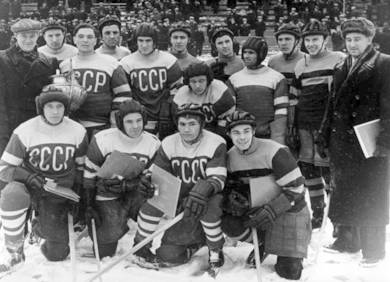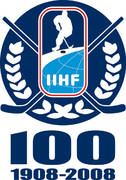

Story #4 Soviets hammer Canada, win gold at their first WorldsMarch 7, 1954 – Stockholm, Sweden
There is no question that 1954 was the start of the modern era of international hockey. Prior to the World Championship in Stockholm, Sweden, that year, Canada ruled the ice lanes uncontested. Indeed, from 1920 to 1954, it lost only two significant games, one to the United States at the 1933 World Championship and one to Great Britain at the 1936 Olympics.  While the Soviets were going through the tournament in spectacular fashion, however, Canada was doing even better. It won all six of its games by an aggregate score of 57-5, and this domination led to the all-important Canada-Soviet Union showdown of March 7, the final day of the tournament. Canada needed only a tie to claim gold while the Soviets had to win outright if they were to take home gold. In the end, it was no contest. About the Top 100 StoriesAs part of the IIHF's 100th anniversary celebrations, www.IIHF.com is featuring the 100 top international hockey stories from the past century (1908-2008). Starting now and continuing through the 2008 IIHF World Championships in Canada, we will bring you approximately three stories a week counting down from Number 100 to Number 11.
The Final Top 10 Countdown will be one of the highlights of the IIHF's Centennial Gala Evening in Quebec City on May 17, the day prior to the Gold Medal Game of the 2008 World Championship.
These are the criteria for inclusion on this list: First, the story has to have had a considerable influence on international hockey. Second, it has to have had either a major immediate impact or a long-lasting significance on the game. Third, although it doesn't necessarily have to be about top players, the story does have to pertain to the highest level of play, notably Olympics, World Championships, and the like. The story can be about a single moment — a goal, a great save, a referee's call — or about an historic event of longer duration — a game, series, tournament, or rule change. |
 Click here for the 100 Top Stories
|
|






